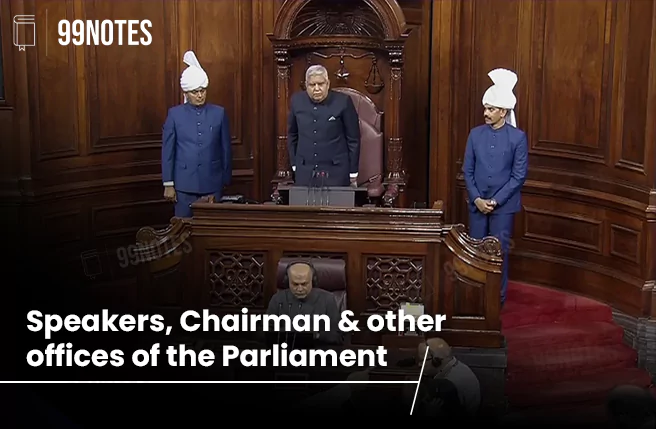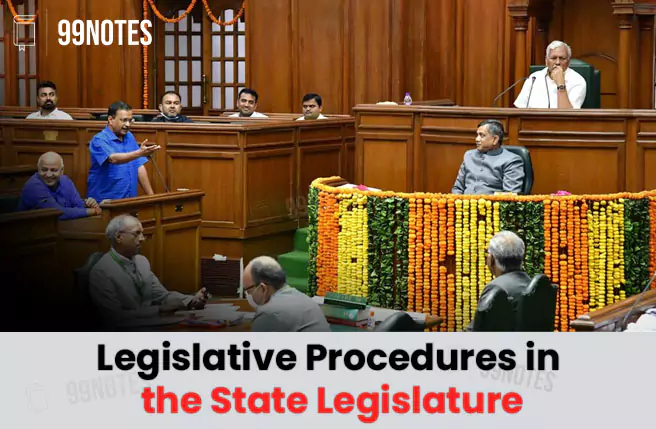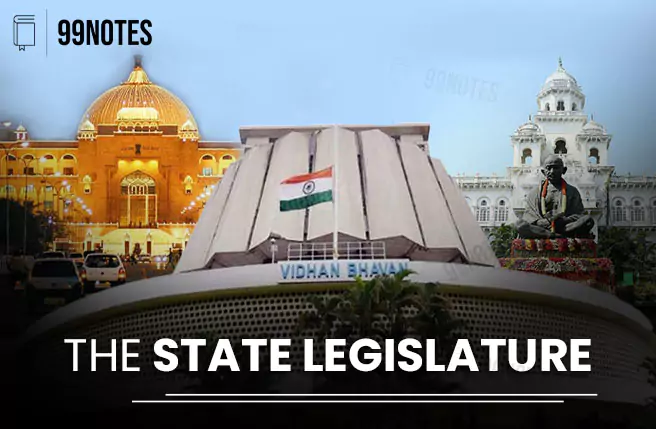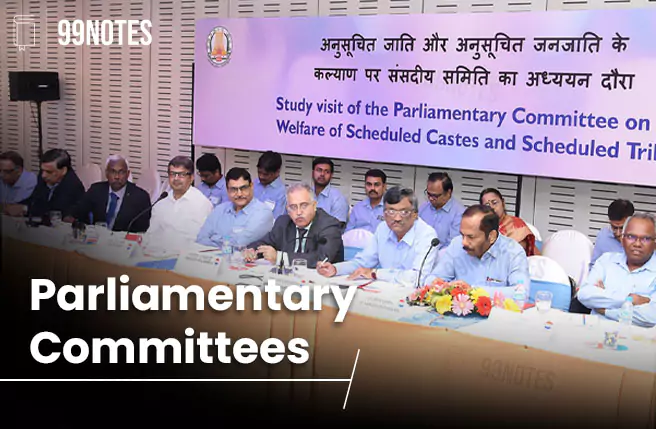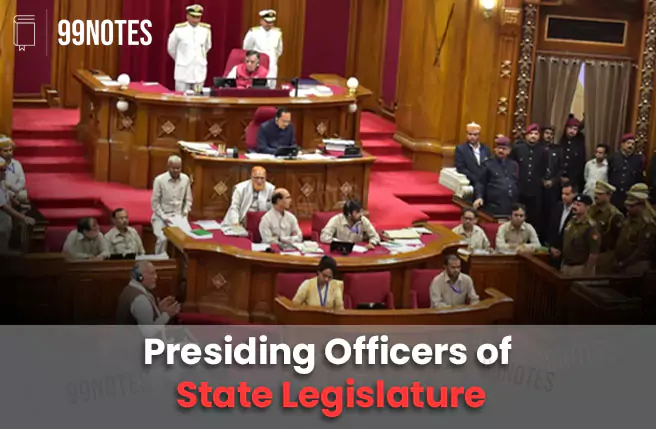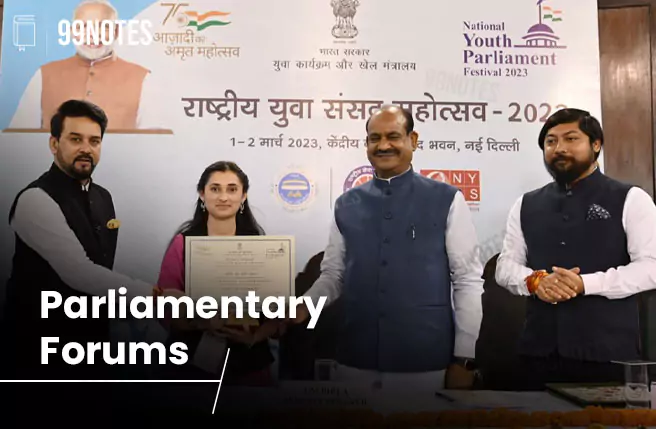Speakers, Chairman and other offices of the Parliament
Presiding officers of the Parliament:
Both houses of the Parliament have a presiding officer; the Lok Sabha has a Speaker as the principal presiding officer and a deputy speaker to assist him/her and preside over the chair in his/her absence. Similarly, the Rajya Sabha is presided over by the Chairman (Chairperson) and assisted by the deputy chairperson, who performs the duties of the Chairperson in his/her absence.
Besides them, there is also a panel of chairpersons in the Loksabha and a panel of vice-chairpersons in the Rajya Sabha.
Speaker of the Lok Sabha
The Speaker is the principal presiding officer in the lower house of the Parliament. The office of Speaker is modelled on the Speaker of the House of Commons of Britain’s Parliament. S/he works non-partisanly and is the guardian of the house’s customs, powers and privileges and its members.
However, in India, the Speaker is not required to resign from the party, unlike Britain, where there is a convention of ‘once a speaker, always a speaker’.
Historical Background
- The post of Speaker and Deputy Speaker of Lok Sabha came into being in 1921 under the provisions of the Government of India Act 1919. Till 1947, the post of Speaker and Deputy Speaker were known as the President and Deputy President, respectively.
- Frederick Whyte and Sachchidanand Sinha were the first President and deputy president, respectively, of the central legislative assembly.
- Vithalbhai Patel became the first elected and first Indian President of the central legislative assembly in
- GV Mavalankar became the first Speaker of Lok Sabha of the independent India.
Election and Term of the Speaker
The Speaker is elected by the Lok Sabha amongst its members (after its first sitting) with a simple majority.
- The date of election is determined by the President.
- The term of the Lok Sabha speaker is co-terminus with the life of the Lok Sabha.
Oath: The Speaker and deputy speaker do not subscribe to separate oath or affirmation.
Removal of the Speaker
- The Speaker can be removed by passing a resolution by the majority of the members of the Lok Sabha (Absolute majority). It is required to give 14 days’ resolution before such resolution can be passed.
- The Speaker cannot preside over the proceedings of the Lok Sabha when the resolution to remove him/her is under consideration. Though s/he can take part, speak and vote (not in case of a tie) in the proceedings of the lower house.
Vacancy in the office of the Speaker
The office of the Speaker can become vacant if s/he:
- He is no longer a member of Lok Sabha.
- Resigns from the office by addressing the resignation letter to the deputy speaker.
- It is removed by the Lok Sabha.
However, the Speaker does not vacate the office upon the dissolution of the Lok Sabha; s/he continues till the newly constituted Lok Sabha meets.
Roles, Powers and Function of the Speaker
The Speaker is the head and the chief spokesperson of the lower house. Besides presiding over the proceedings of the house, the Speaker is vested with various other powers and responsibilities, as derived from three sources:
- Constitution of India
- Rules of Procedure and conduct of business rules of the Lok Sabha
- Parliamentary Conventions
The Speaker has the following roles and responsibilities:
- Presides over the meetings: The Speaker presides over the proceedings of the house and conducts meetings in the Lok Sabha. S/he also presides over the joint session of the house. S/he can allow secret meetings of the house at the request of the Leader of the house.
- Maintains discipline and decorum of the house: The Speaker has the power to ask a member to leave the house or even suspend the.
- Interpreter of Provisions related to the House: As presiding officer of Lok Sabha (or Joint Session), the Speaker is the final interpreter of the Constitution, Rules of procedure of the conduct of the Lok Sabha and parliamentary conventions and precedents with regard to the Lok Sabha.
- Maintains Quorum: The Speaker can adjourn the house or suspend the meeting of the house in case of absence of the quorum of the house, i.e. 1/10th of the strength of the house.
- Principal Spokesperson of the house: The Speaker represents the collective voice of the house.
- Decides the agenda of proceeding: S/he has the sole authority to admit or reject motions like adjournment motions, no-confidence motions, calling attention notices, etc.
- Custodian of Privileges: Both the collective privileges and individual privileges are protected by the Speaker and can refer the complaints of breach of privilege to the Privileges committee of the Lok Sabha.
- Certification of the Money Bill: The Speaker certifies whether the bill is a money bill or not. S/he also authenticates the bill when it is sent for the consideration of the Rajya Sabha and when it is finally sent for the President’s assent.
- Casting Vote: S/he does not vote in the first instance but can cast a vote in case of a tie.
- Disqualification of members: The Speaker also adjudicates on the disqualification of the members on account of defections under the 10th schedule of the Constitution.
- Constitutes Parliamentary Committees: The Speaker appoints the chairpersons of the parliamentary committees of the lower house and oversees the functioning of these committees. The Speaker himself/herself is the Chairperson of the following committees of the Lok Sabha:
-
- Business Advisory Committee
- General Purpose Committee
- Rules Committee
- Other Positions: S/he is the ex-officio Chairperson of the Indian Parliamentary Group of Inter-Parliamentary Union as well as the Chairperson of the conference of presiding officers of the legislative assemblies.
Wherever Speaker acts in his/her discretion, their decision is final, may it be certification to a money bill or interpretation of other constitutional, legal or parliamentary provisions.
Provisions that ensure Impartiality and independence of the Post of Speaker
The Constitution has made many provisions for the Speaker to ensure the independence of the Legislature.
- Security of tenure: The Speaker can be removed only by a resolution passed by an absolute majority (majority of the total membership of the house). Such a motion can only be considered if at least 50 members support it.
- Speaker’s remunerations are charged on the consolidated fund of India, which means it is not subject to voting by the Parliament.
- Not allowed to vote in 1st instance: To make its position impartial, s/he is allowed to vote only in a situation of tie.
- The decision cannot be challenged in court: His/her function and power related to the maintenance of discipline and conducting business of the house does not come under the jurisdiction of any court.
Provisions made in places other than the Constitution:
- Speaker’s criticism is not allowed: His/her work can be discussed and criticised only through a substantive motion. (Provided in the rules of Procedure of Lok Sabha)
- Order of precedence: s/he has the 7th place along with the chief justice of India. (Provided by the President’s Secretariat)
“Once a Speaker, always a Speaker.” |
| This phrase is ascribed to the Speaker of the House of Commons in Britain. It signifies the apolitical and impartial credentials of the Speaker. In Britain, the Speaker is required to resign from the office, and s/he is elected unopposed by the house which strengthens the reputation of the Speaker of being impartial. |
Deputy Speaker of the Lok Sabha
The deputy speaker assists the Speaker in the discharge of his/her duties and also presides over the proceedings of the house in the absence of the Speaker. The post of deputy speaker is not subordinate to the Speaker.
Election, Term and Removal of the Deputy Speaker
Similar to the Speaker, the deputy speaker is also elected by the Lok Sabha from amongst its members with a simple majority after the election of the Speaker has taken place.
- The date of their election is fixed by the Speaker.
- The term, process of removal and provisions related to the vacancy of the Deputy Speaker’s office are similar to that of the Speaker.
- Since the 11th Lok Sabha, there has been a consensus that the Deputy Speaker should be from the opposition party. In the 17th Lok Sabha, the post of deputy speaker is vacant.
Role, Function and Power
Deputy speaker enjoys functions and powers similar to that of the Speaker of Lok Sabha.
- The deputy speaker assumes all the powers of the Speaker while presiding over the house, including presiding over the joint session of the Parliament in the absence of the Speaker.
- When the deputy speaker is appointed as a member of any committee, s/he automatically becomes its Chairperson.
- The deputy speaker, too, cannot vote in the first instance and can only cast votes in case of a tie.
However, when not presiding over the proceedings, the deputy speaker is like any other member of the house and can participate, speak and vote on any matter.
Pro Tem Speaker
It is a temporary post appointed for the conduct of business in the Lok Sabha when the Speaker of Lok Sabha has not been elected and enjoys all the powers of the Speaker.
- The President him/herself appoints him/her. The convention is to appoint the seniormost member of the Lower House as the Pro tem Speaker.
- The main function of the Speaker Pro Tem is to administer oaths to the newly elected members.
- The office of Pro Tem Speaker ends after the election of the Speaker.
Panel of Chairpersons of the Lok Sabha
As per the Lok Sabha rules, the panel of chairpersons is nominated by the Speaker amongst its members to assist the Speaker and deputy speaker.
- The member of the panel will have the same powers as the Speaker while presiding over the house.
- In the case of vacancy in the office of Speaker and deputy speaker, the panel cannot preside over the proceedings of the house. During this period, the house is presided over by a person whom the President has appointed for that purpose.
Criticism of the Office of Speaker
The Speaker represents the collective voice of the house; hence, it becomes very important that the office of the Speaker remain independent and impartial. The role and function of the Speaker have been the subject of criticism for the following reasons:
- Affiliation with the Party: Even though the office of the Speaker is more or less similar to the Speaker of the House of Commons in Britain, the Speaker in India is not required to resign from his/her party, unlike the Speaker of the House of Commons. This compromises the Speaker’s reputation of being impartial.
- Powers related to the 10th Schedule: Under the 10th schedule (regarding the disqualification of defected members), the power of the Speaker is criticised for being too wide. Also, Speakers in the past have been accused of being impartial while deciding the disqualification of defected members. In the Kihoto Hollohan Case, the Supreme Court upheld the sweeping powers of the Speaker in these matters but maintained that they were not beyond judicial review.
- Powers related to certification of money bills: The discretionary power of the Speaker as the final authority in certifying bills as money bills has also been the subject of criticism in the past. For example, the certification of the Aadhar bill as a money bill was challenged in court.
- Decreasing Productivity: It is also argued that due to undue influence from the ruling party/coalition, the Speaker is not able to conduct the proceedings of the house in an efficient manner.
Way Forward
- The convention in the British House of Commons that the Speaker should resign from the political party should be adopted here, too.
In India, Neelam Sanjeev Reddy, upon election as Speaker, had resigned from the party.
- The Dinesh Goswami Committee recommend that the decision regarding the disqualification of the defected members should be decided by the President/Governor on the recommendation of the Election Commission.
- The Supreme Court in 2020 urged the Parliament to establish an independent tribunal to decide on the disqualification of members on the grounds of defection.
Chairperson of the Rajya Sabha
The Chairperson of the Rajya Sabha is an ex-officio position that is occupied by the Vice-President, who presides over the proceedings of the Rajya Sabha.
Term and Removal
The term of the Rajya Sabha chairperson is co-terminus with their term as the Vice-President, given in Article 67 of the Constitution.
The Chairperson of the Rajya Sabha can be only removed when s/he is removed as a Vice-President, i.e. through a Rajya Sabha resolution passed by a majority of the then total membership of the house and agreed to by the Lok Sabha. Thus:
- Such a resolution can only be initiated in the Rajya Sabha.
- It must be passed by more than half of the current total membership of the house. For example, if only 230 elected members existed today and other seats were vacant due to any reason. Then, regardless of the total members present in the house, the resolution for the removal of Vice-president requires more than 115 votes.
- Nominated members of the Rajya Sabha participate in this voting too.
- Such a resolution should be passed by a Simple majority in Lok Sabha.
Such a resolution can only be introduced in the Rajya Sabha. Further, a 14-day notice should be given to the Vice-President before such a resolution.
Remuneration
Similar to the Speaker, the Parliament fixes his/her remunerations, and these are charged on the consolidated fund of India and not subject to voting by the Parliament. During the time s/he discharges the duties of Vice-President, s/he is not entitled to remunerations payable to the Rajya Sabha chairperson.
Power and Functions
- The power and function of the Rajya Sabha chairman is similar to that of the Lok Sabha Speaker.
- However, while discharging the duties as the President, the Vice President cannot preside over the proceedings of the house
How Post of Rajya Sabha Chairman differs from Speaker of Lok Sabha
| Lok Sabha Speaker | Rajya Sabha Chairperson | |
| Membership | The Lok Sabha Speaker is a member of the house. | The Rajya Sabha chairperson is not a member of the house. |
| Voting | Can vote in case of a tie | Can never cast a vote |
| Money bill | Certifies whether a bill is a money bill | No such power |
| Joint Sitting | The Speaker presides over the meeting of the joint session | No such power |
| Removal | Speakers can vote like regular members when a resolution for their removal is under consideration. | Rajya Sabha chairman, though allowed to participate and speak, is not entitled to vote in such circumstances. |
Dual Role of Rajya Sabha Chairperson |
| The Vice-President of India, also the Ex-official Chairperson of the Rajya Sabha, has been conferred with the dual role of Presiding Officer of the upper house and the President in certain contingencies. This is a particularly unique feature in a Parliamentary form of government. The Constitution makers adopted this feature from the American Presidential system. |
Deputy Chairperson of Rajya Sabha
- The deputy chairman is elected by the Rajya Sabha from amongst its members with a simple majority.
- S/he can be removed by passing a resolution by the majority of all members of the house (Effective majority). The resolution to remove the deputy chairperson can be brought after giving 14 days’ notice.
Power and Functions
- The deputy chairperson performs the duties of the Chairperson of the Rajya Sabha while the Chairperson (i.e. the Vice-President) is discharging their duties as President or during their absence.
- The office of the deputy chairperson is not subordinate to the Chairperson of the Rajya Sabha.
- When the Chairperson is presiding over, the deputy chairperson is just like any ordinary member of the house.
- However, the Deputy Speaker has one additional power over the Vice-President. While presiding over the house, s/he can only vote in case of a tie (casting vote), but the Vice-President cannot as s/he is not a member of the house.
Remuneration
Like the Chairperson, his/her remunerations are fixed by the Parliament and are charged on the consolidated fund of India, which means it is not subject to voting by the Parliament.
Panel of Rajya Sabha Chairpersons
- The Rajya Sabha chairperson nominates a panel of chairpersons.
- Any one of them can preside over the house in the absence of the Chairperson or deputy chairperson.
- While presiding over the house, they assume the same powers as Chairperson and deputy chairperson.
- However, they cannot preside over the proceedings of the house if the office of the Chairperson or deputy chairperson is vacant. During such time, the house is chaired by a person appointed by the President for that purpose.
Leader of the House (Lok Sabha) & Leader of Rajya Sabha
- These offices are not mentioned in the Constitution and have been created under the Rules of Lok Sabha and Rajya Sabha.
- If the Prime Minister is a member of the Lok Sabha, then s/he is the Leader of the house; otherwise, s/he nominates a minister as the Leader of the Lok Sabha.
- Similarly, the Prime Minister nominates a minister to serve as the Leader of the Rajya Sabha.
- In the USA, a similar post is known as ‘majority leader’.
- The Leader of the house is an important position in the house; the Speaker and Chairperson consult with the leaders of both houses for the conduct of business of the houses.
Leader of Opposition (LoP)
The LoP is the parliamentary Chairperson of the largest opposition party in either of the houses. The position was given a statutory status under the Salaries and Allowances of Leader of Opposition Act, 1977. They are entitled to remunerations and other facilities equivalent to those of a cabinet minister. The same position in the USA is known as ‘minority leader’.
- There is a parliamentary convention that the party getting at least 10% of seats of the total membership of either of the Houses is eligible for the post of Leader of the Opposition. However, this rule is not mentioned in the statute.
- The Speaker in Lok Sabha and the Chairperson in Rajya Sabha have the power to recognise the Leader of the opposition in their respective houses.
Function and Power of Leader of Opposition
- They provide constructive criticism of the government.
- They are consulted by the ruling party on important legislative matters.
- They have an important role to play in the effective and smooth functioning of the Parliament.
- The Leader of the opposition is involved in the selection of heads of various Constitutional and statutory bodies like the Central Vigilance Commission, the Central Bureau of Investigation (non-statutory), the Central Information Commission, and the Election Commission.
Shadow Cabinet |
| It is a British Political institution formed by the opposition party to mirror the actual cabinet in power to scrutinise government actions and policies and offer alternative policies. It has no executive Power. Other countries such as Australia, New Zealand, and Canada also has a similar institution. |
Whip
The Whip is an official appointed by the political parties to enforce discipline and monitor the behaviour of their members in Parliament, such as their attendance, participation in parliamentary activities, etc. They ensure that their party members are present during discussions or voting on important issues;
- The office of Whip is not a statutory position nor mentioned in House rules. It is based on parliamentary convention.
- They can also issue directives regarding voting on particular issues.
- Violation of their direction can lead to expulsion from the party and can be grounds for disqualification under anti-defection law.
Parliament Secretariat
Each house of the Parliament has a secretariat that functions under the control and guidance of the Presiding officers of the Parliament. It assists the presiding officers in discharging their constitutional and statutory responsibilities.
Secretary-General
- Both Parliamentary secretariats are headed by the Secretary Generals, who are appointed by the presiding officer.
- Their rank is equivalent to the Cabinet Secretary in the government of India.
- They remain in office till the retirement age of 60.
- On behalf of the President, they summons the respective member to attend the sessions of Parliament.

